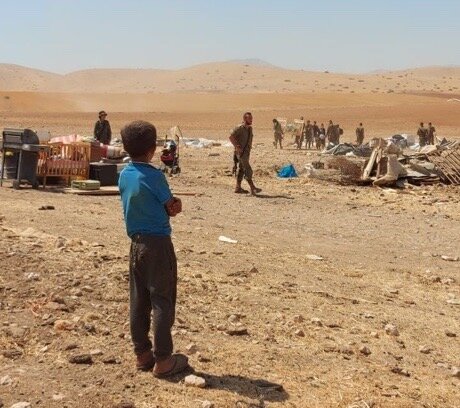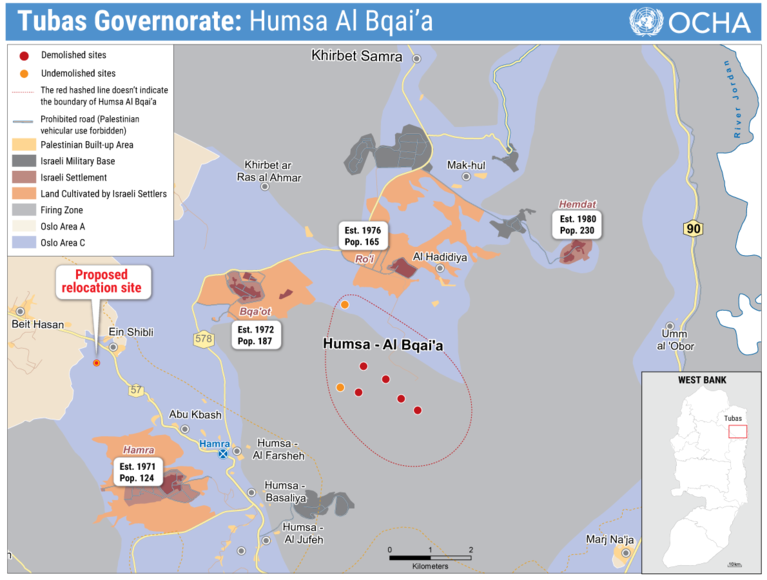Humsa al Bqai'a | Flash Update #7
Highlights
- On 7 July, the Israeli Civil Administration (ICA), accompanied by the military, carried out a mass demolition in the Palestinian herding community of Humsa - Al Bqai’a in the Jordan Valley. Following an assessment today, it has been established that the ICA demolished 30 structures, including residential units and animal shelters. Some 17 of the structures demolished or confiscated yesterday had been provided as a humanitarian response following previous mass demolition incidents in February 2021, in which 55 structures, in total, were demolished or confiscated. As a result, six Palestinian families, comprising 42 people, including 24 children, were again displaced and are at heightened risk of forcible transfer. Other items including mobile water tankers, plastic water tanks and animal troughs were confiscated, some of which were damaged in the process. The ICA also confiscated personal belongings, including food, milk for children, clothes, hygiene materials and toys. Three other families in the community, comprising 18 people, including 11 children, have been affected because their livelihood structures were demolished or confiscated.
-
Since the demolition, the ICA has not allowed any humanitarian assistance to be delivered to the part of the community which remains at the site, with the sole exception of some water bottles today. Having repeatedly been refused access, humanitarian organizations were allowed to access the demolition site for only a few minutes today. Some people remain at the site of the demolition, while the majority of women and children have temporarily moved to a nearby hamlet. There, they have received some initial humanitarian assistance.
-
The ICA maintains that the residents of Humsa – Al Bqai’a have settled illegally in a military restricted training area: See position under International humanitarian law below. The ICA has repeatedly requested the community to move to a different location, which they have consistently refused. Yesterday the military transported the community’s belongings to this location, where they remain, unguarded. The repeated destruction of their homes and property, including assistance provided by the humanitarian community, is having a devastating economic, social and traumatic impact on the community, particularly children.
-
During the mass demolition incidents in February 2021, the international community visited Humsa – Al Bqai’a several times and expressed support for the residents. On 7 July, Lynn Hastings, the Humanitarian Coordinator, tweeted that “The UN and members of the international community have repeatedly called for the Israeli Government to cease unilateral actions including demolitions in the West Bank. Residents of Humsa – Al Bqai’a are a protected population; forcing them to leave their homes is contrary to the international law applicable in the West Bank.”
-
So far in 2021, the Israeli authorities have demolished, seized or forced people to demolish at least 421 Palestinian-owned structures, including 130 donor-funded, displacing 592 people, including some 320 children across the West Bank. This represents a 24 per cent increase in structures targeted, a near 110 per cent increase in donor-funded structures targeted, and over 50 per cent increase in people displaced, compared with the equivalent period in 2020.
For additional information on the deteriorating humanitarian situation in Humsa - Al Bqai’a, please see the previous six Flash Updates.
Situation overview
The Palestinian Bedouin community of Humsa – Al Bqai’a, is located in Area C in the northern Jordan Valley, mostly in an area designated as a ‘firing zone’ for Israeli military training, where Palestinian residency or access is prohibited. Designated firing zones, which cover nearly 30 per cent of Area C, are home to 38 Palestinian Bedouin and herding communities with a population of 6,200. These are some of the most vulnerable communities in the West Bank, with limited access to education and health services, and water, sanitation, and electricity infrastructure. On numerous occasions since 2012, Humsa – Al Bqai’a has been temporarily displaced while the Israeli authorities carried out military trainings in the vicinity. OCHA has recorded over 50 such incidents during this period.
Humanitarian response & ongoing needs
Humanitarian organizations need full access to the community to properly provide humanitarian assistance.
Protection
- Today, protection partners provided psychosocial support to the community, including on-site Mental Health and Psycho-Social Support Services (MHPSS) and assessed their protection needs, including child protection. Initial psychosocial support for women and children was provided, but without privacy for individual sessions. Protection partners will coordinate and provide further psychosocial support over the weekend.
Shelter
- Shelter partners provided basic household items and cash to all six displaced households. Partners are ready to provide basic emergency shelters and non-food items (NFIs).
Water, Sanitation and Hygiene (WASH)
- WASH partners provided hygiene kits and are ready to cover other WASH-related needs.
Health
- There is an urgent need for medicines for community members with diabetes and hypertension.
Food Security
- There is an urgent need for fodder and shelter for the livestock. The Palestinian Red Crescent Society (PRCS) is ready to provide food parcels.
International humanitarian law: Demolitions, displacement and the risk of forcible transfer
International humanitarian law (IHL) requires an occupying power to protect the population of the territory that it occupies, ensure its welfare and wellbeing, as well as the respect for its human rights. Any destruction of civilian property by the occupying power is prohibited, except when rendered absolutely necessary by military operations, which is not relevant in the West Bank where there are currently no active hostilities. The extensive demolition of property is a grave breach of the Fourth Geneva Convention and may amount to a war crime. Other than for the security of the population or imperative military reasons, IHL further prohibits the transfer of the population of an occupied territory without the genuinely and fully informed consent of the affected people, regardless of the motive. Consent is not considered genuine in an environment marked by the use, or threat, of physical force, coercion, fear of violence or duress. In the absence of such consent, the transfer is forcible and constitutes a breach of the Fourth Geneva Convention.











